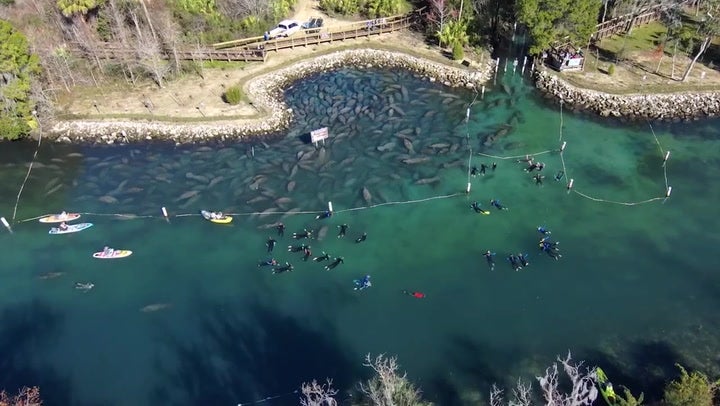Nearly 1,000 manatees gather in Florida after ‘very unusual’ mass mortality event
The throng of nearly 1,000 creatures was seen on 21 January in Blue Spring State Park, north of Orlando
Your support helps us to tell the story
From reproductive rights to climate change to Big Tech, The Independent is on the ground when the story is developing. Whether it's investigating the financials of Elon Musk's pro-Trump PAC or producing our latest documentary, 'The A Word', which shines a light on the American women fighting for reproductive rights, we know how important it is to parse out the facts from the messaging.
At such a critical moment in US history, we need reporters on the ground. Your donation allows us to keep sending journalists to speak to both sides of the story.
The Independent is trusted by Americans across the entire political spectrum. And unlike many other quality news outlets, we choose not to lock Americans out of our reporting and analysis with paywalls. We believe quality journalism should be available to everyone, paid for by those who can afford it.
Your support makes all the difference.An unprecedented gathering of manatees has been observed in Florida, wildlife officials reported.
The throng of nearly 1,000 creatures was seen on 21 January in Blue Spring State Park, north of Orlando.
“Record-breaking morning,” park officials posted on Facebook. “Happy manatee season everyone!”
Some 932 manatees were counted - more than 200 sea mammals than gathered in the park’s waters on New Year’s Day.
Experts say that the manatees gather in such large numbers so that they can huddle together for warmth when the water temperature drops.
It the “coldest morning of the season” with the water temperature at 58F (14C), according to the Save the Manatee Club. When the water drops below 68F for long periods of time, manatees can suffer from conditions similar to hypothermia, pneumonia or frostbite in humans.

The marine mammals have slow metabolisms and only an inch of fat despite their “blubbery” look. “This biology makes sanctuaries such as Blue Spring vital for their survival,” park officials said.
But the news came just days after the Florida Fish and Wildlife Conservation Commission announced that in the first 19 days of January, 30 manatees were reported dead in the state.
Scientists from the Center of Biological Diversity warned that it was an “unusual mortality event”.
Four fatalities were caused by watercraft strikes, four were newborns, two died of cold stress, six were natural deaths and five remain undetermined, according to the commission’s report. Another nine were yet to undergo necropsies.
“This is an alarming number of watercraft mortalities through the first three weeks of the year, especially given the lower number of boaters during the winter,” Ragan Whitlock, attorney with the Center for Biological Diversity based in Saint Petersburg, told The Independent, in an email.
Some 500 manatees died in Florida last year - 86 deaths from boat collisions and around 100 due to an algal bloom.
“Red-tide” algal blooms are known to produce toxins, which in large amounts can kill off dolphins, turtles, birds, and manatees. The toxins leave creatures struggling to surface and breathe, leading to paralysis or death.
More than 1,000 manatees perished in 2021. It was the deadliest year on record for the gentle creatures, and caused by a lack of seagrass for them to eat, officials said.

Join our commenting forum
Join thought-provoking conversations, follow other Independent readers and see their replies
Comments